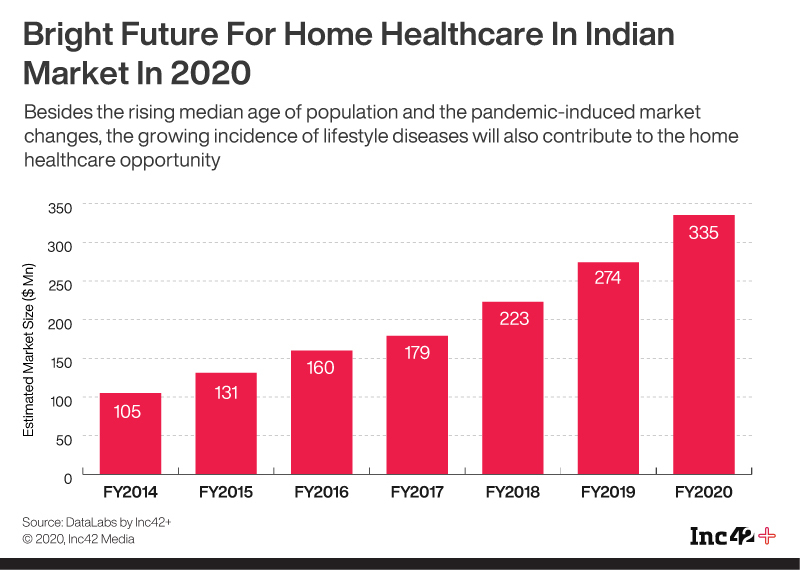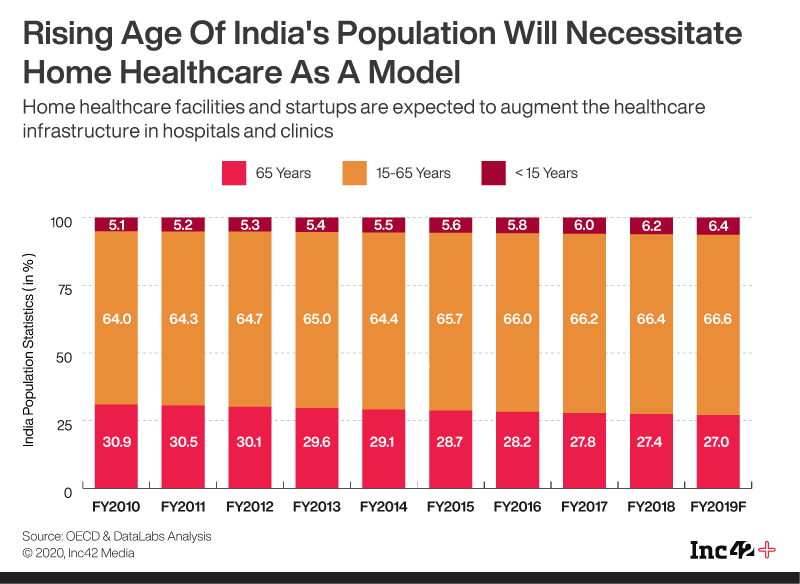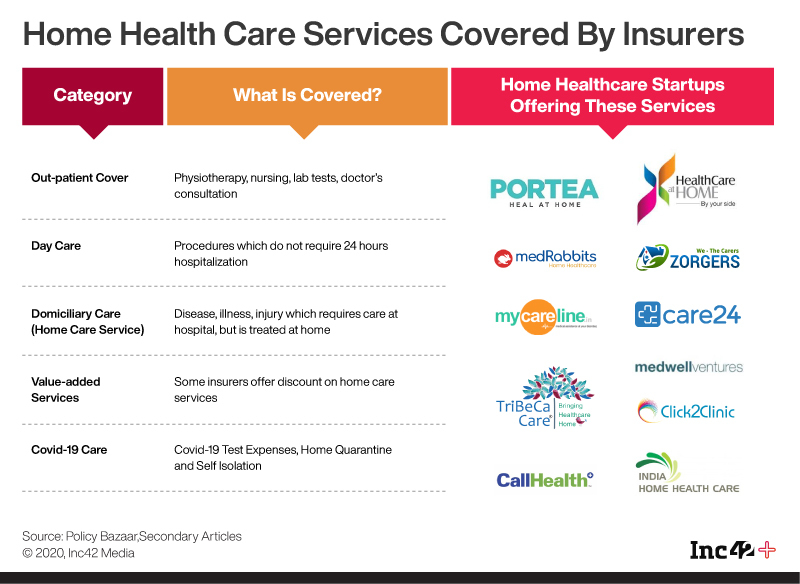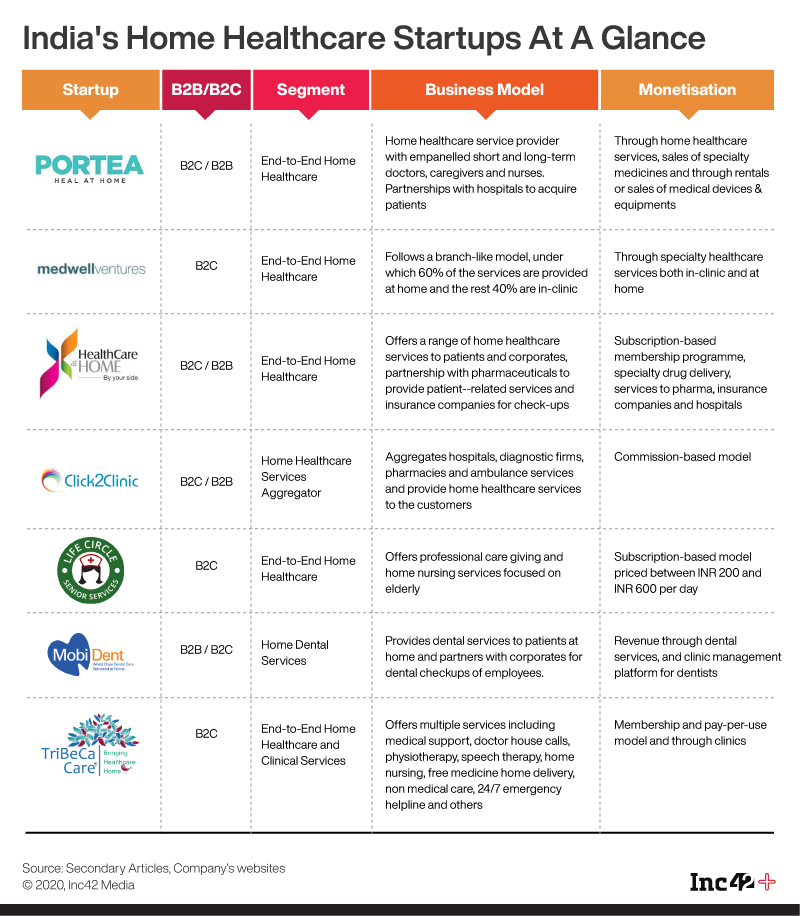The Covid-19 pandemic has unleashed a wave of fear across all sections of the consumer market, and it has particularly left the eldery feeling the dread of venturing outside. As the coronavirus is said to be particularly harsh on senior citizens suffering from comorbidities, patients that did not contract Covid-19 had to revisit how to go about their treatment. Unwilling to visit hospitals to undergo treatment for chronic ailments, surgeries, diagnosis and even routine checkups, the situation has revived the oft-ignored healthcare at home segment.
Private hospitals and healthtech startups have not only had to focus on telemedicine in the past few months, but actually made it their first choice in many instances. However, healthcare at home, which is a segment with deeper roots in the Indian market than telemedicine has often been confined to the sidelines in the healthtech debate. Not anymore as the pandemic has paved the way for greater adoption and deeper penetration of services.
Emergence Of Home Healthcare Market
The home healthcare industry in India was once an unorganised and scattered market, but startups such as Gurugram-based Healthcare at Home India have been trying to organise and digitise it since early 2000s.
With the advent of more advanced technology for creating products and services, the healthcare at home market has changed dramatically in the past two decades. Following HCAH India, the likes of Portea Medical, Medwell Ventures, Care24, Clic2Clinic, Life Circle, iKure, Mobident and others also ventured into the space. Home healthcare is at an early growth stage in India and contributes around 5% to the healthtech market in 2020. It has shown a growth of CAGR 30.16% during the past decade (2010-2020).
According to the recent report of DataLabs By Inc42+ on “Healthtech Landscape Post Covid-19”, the home healthcare market is estimated to reach around $837 Mn by 2025. The market will witness a growth of CAGR 20.1% for next five years.

The growth in the market can be attributed to rise in the ageing population, growth in chronic lifestyle diseases, lack of access to physical clinics and the conventional healthcare infrastructure, affordability of services and increasingly sedentary and isolated lifestyles in the urban context. Moreover, the growing health awareness among consumers in general has also helped drive up the relevance of home healthcare, particularly with the market still under the impact of the Covid-19 pandemic.
Significantly, the steady rise in the population aged 65+ is a major indicator that healthcare at home will become a preferred service for a huge section of the population. Plus, the drop in the under-15 population also expands the future potential addressable base.

Did Covid-19 Accelerate Home Healthcare Adoption In India?
Amid the rise in Covid-19 cases in India, with over 2.1 Mn cases or 10% of the global tally, as of August 11, 2020, citizens are concerned about the already-stretched healthcare infrastructure and resources in India. The increasing number of cases that are occupying private hospital beds, make healthcare at home not only more lucrative, but perhaps the only option for many.
With the number of asymptomatic cases or cases with mild symptoms, there’s a big need for home healthcare services that will free up hospital beds.
Know More About India’s Healthtech Landscape
The challenges faced by the home healthcare sector in pre Covid-19 times were the cost of enabling the home healthcare services which is not covered by most insurance companies. However, since telemedicine is now under the purview of insurance, home healthcare services are being covered by the likes of Bajaj Allianz and ICICI Lombard General.

Healthcare at Home India has partnered with HDFC Ergo and ICICI Lombard General Insurance during Covid-19. HCAH India CEO Vivek Srivastava told Inc42 that the company has reinvented itself during Covid-19. “We are offering Covid-19 sample pickups, working with corporates for operating employee helpline and helping them restart their factories and set up oxygen facilities in RWAs, in corporates, in guest houses etc.”
The outbreak of pandemic has flooded the hospitals with Covid-19 patients leaving less room for access to other patients, and even if the healthcare services are available to other patients, people are quite reluctant to go to a hospital due to the fear of Covid-19 in their minds. As a result home healthcare startups have witnessed phenomenal growth during the Covid-19 lockdown. HCAH India witnessed 60% month-on-month growth during the Covid-19 period, claimed Srivastava.

Portea Medical, another major player in the home healthcare sector, claimed that Covid-19 has brought in a growth of 60% some areas and there is a significant surge in the calls for consultation on our telemedicine helpline numbers compared to the pre-Covid days. The startup observed a rise in the demand for services such as chemotherapy and dialysis at home, apart from contactless healthcare for non-critical services such as minor ailments, fever, and health-related queries.
Kolkata-based Tribeca Healthcare launched a range of services during the Covid-19 lockdown such as its Envelope of Care, a personalised service for the elderly with an optimal level of care vs social distance; Dare to Care, a minimal contact delivery of essentials, especially to those elderly people; free counselling over the phone; and Nirbhor, an assisted telemedicine platform. The company set up stethoscopes, pulse oximeters, spirometers and other devices in the homes of elderly before teleconsultations.
Know More About India’s Healthtech Landscape
Not only this, with the buzz around home quarantine and home isolation, many home healthcare startups expanded their services during Covid-19. The startups have either partnered with hospitals or governments to provide home isolation and home quarantine services to people.
Healthcare at Home India partnered with Fortis hospital for their home isolation programme and it also partnered with Delhi and Karnataka Government for home isolation and home quarantine services.
While Portea Medical partnered with the Delhi government for their home isolation programmes, private hospitals also joined the league and have stepped into this sector for home isolation and home treatment for asymptomatic Covid-19 patients. Max Healthcare, Medanta and Fortis Healthcare in Gurugram have begun providing treatment at home to Covid-19 patients with mild symptoms.
Apollo Hospitals launched a Covid-19 response plan ‘Project Kavach’ (meaning ‘shield’) that encompasses all aspects from information, screening and assessment, testing, to readying the infrastructure for quarantine and treatment. Apollo has also introduced Stay I @HOME, which is a comprehensive program of medical care and advisory services for COVID-19 patients for 14 days of home quarantine period.
With Telemedicine Diversification, Is Home Healthcare Moving Towards Consolidation?
Covid-19 has brought in opportunities for healthtech sector segments varying from telemedicine, diagnostics, remote health monitoring, sample check ups and home healthcare. Despite the increase in demand from urban centres, telemedicine as a core and standalone model is not majorly prevalent in the Indian market, as we saw in the Inc42+ Playbook on the Healthtech sector. Even core telemedicine players such as Practo, Lybrate, CallHealth, DocsApp, myUpchar and mFine are diversifying their revenue streams to earn steadily and also create a seamless experience for the customer.
These startups offer services such as physiotherapy, medicine supplies, nursing, weight management and others in addition to telemedicine.
One of the major home healthcare startups, Portea offers telemedicine as a peripheral service since the beginning, however it hasn’t been scaled up.
“After lockdown, teleconsultation was essential. So, we relaunched it and it picked up. That has made us realise this is something very important. So to make it broadbased we have started working with corporates as well”, said Meena Ganesh, CEO & Cofounder of Portea Medical.
Thus, the market is expected to witness the entrance of telemedicine players into home healthcare services along with other services while home healthcare players expanding their services by adding telemedicine, diagnostics, epharmacy and others to their portfolio.
The healthcare market is expected to witness consolidation with few mergers and acquisitions expected coming into the space. All the healthtech players are somewhere or the other converging their services to provide a one stop solution to the people creating a seamless experience for them.
Healthcare at Home India’s Srivastava also said that the company is looking forward to offering end-to-end healthcare services rather than doing one part of the puzzle. The company expects to offer seamless experience to customers starting from online consultation to fulfilling lab requirements if any and then fulfill service delivery requirements.
Covid-19 has brought a paradigm shift in the healthcare sector. With people adjusting to the new normal of work at home, it is believed healthcare at home will also join the league.
With the support of government and insurance companies, this sector is expected to grow in the future. Also, due to the reinvention of the home healthcare startups during Covid-19 has brought them in enough spotlight in the eyes of the consumers.
Srivastava added that Covid-19 will bring in a change in the customer behaviour and hence, even post Covid-19, the sector will continue to grow. He mentioned that once the people experience the quality home healthcare services at their own convenience, they will continue with the same even in future.
Know More About India’s Healthtech Landscape
The post How India’s Home Healthcare Startups Are Battling For A Piece Of The $837 Mn Opportunity appeared first on Inc42 Media.
Author: Vaishnavi Dayalani
Date : 2020-08-12T04:34:52.000Z
